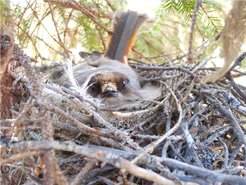Clever birds need caring parents
A comparative study of over a thousand bird species shows that parental care is key for development of brain size
A team led by behavioural and evolutionary biologist Michael Griesser and Carel van Schaik from the Max Planck Institute of Animal Behavior studied the role parental care plays in the development and evolution of brain size. Studying 1,176 species, the researchers compared how much energy parents invest into raising their offspring. The research results have been published in the current issue of the Proceedings of the National Academy of Sciences (PNAS).
Republished from the University of Konstanz
The bigger the better

Brains are key organs because they make sense of the world and make us successfully navigate through our lives. While all animals have brains, some species have rather large brains relatively to their body size – and this is very beneficial. A large brain gives species much more flexibility to deal with every-day problems and helps them make better decisions or find innovative solutions. However, relative brain size (relative to body size) varies tremendously among the around 10,000 bird species. For example, brains of parrots and owls are much larger than those of ducks, geese, and chickens. Brains require unusually high, near-constant energy inputs. In addition, large brains take a long time to reach their full potential. Accordingly, young birds would be unable to acquire the energy needed for large brains to develop.
The role of parental care
In the current study, the researchers examined birds across the whole avian pedigree. From ostriches to sparrows, they looked at clutch size, egg mass, and the amount of time parents provide their young with food. Precocial species, such as ostriches, chickens, geese, and ducks, have large clutches and large eggs. "But that's the end of the parental energy input," says first-author Michael Griesser, who is also affiliated with the University of Konstanz. Shortly after hatching, precocial chicks leave the nest and find their own food.
“In contrast, altricial birds, such as sparrows, parrots, and crows, hatch underdeveloped. Their growing brains have a different neuronal structure compared to those of precocial species: brains of altricial young only need to be capable of supporting body growth, while brains of precocial species have to fully function right after birth," the behavioural biologist explains. Young altricial birds need to be fed both in the nest and also after fledging, and thus it takes several weeks or even months until they are nutritionally independent from their parents.
Parental energy matters for brain size
In their comparative study based on published datasets and literature, the researchers conclude: The critical factor for the size of the brain is how much energy the parents invest in the growth of their young, via egg size and active feeding of the young after hatching. "Large brains, in particular, grow at the expense of the parents," says Michael Griesser. The growth of young birds requires a lot of energy, especially brain growth. Without parental energy input, the large brains of the young would not be able to grow. Corvids, which are the biologist's main area of research, have the largest brains relative to body size. Parrots, owls and birds of prey, too, are considered particularly clever.
Numerous studies showed that larger brains are highly beneficial. They allow birds to acquire and process more information, and increase the flexibility and efficiency in daily life. For example, large brained species are better able to find food sources and remember them even after a certain period of time. It’s little wonder that species with larger brains are more innovative and more successful in living in urbanized habitats or settling in novel environments. After all, our own evolutionary success largely depended on our large brains that allowed us to outcompete other species, even if this comes at the price of global climate change. At least, clever species will likely be more successful in dealing with all these changes, hopefully thinking us out of the climate crises.
The results of this study might also explain differences in brain size in other animals. The parental energy provided by fish, amphibians and reptiles is largely limited to the eggs. These animals have much smaller brains than birds or mammals. Thus, long provisioning by parents seems to be a general prerequisite for the evolution of large brains, as is also evident in humans. "There is ample evidence suggesting that parental provisioning and brain size evolved together and that only lineages with extended parental provisioning have the ability to evolve larger brains," Michael Griesser concludes.












